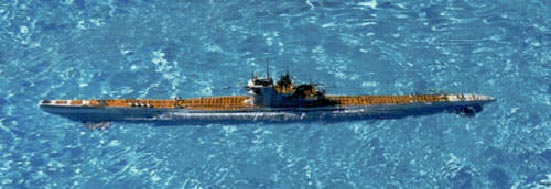The War That Wasn't Fully Declared . . .

The battle of the Atlantic
In World War I Germany had almost defeated Britain with submarines. In World War II at times Germany was winning the war, but in this very crucial theatre; the Royal Navy rose to the challenge. The battle of the Atlantic was far reaching and lasted five years, from Sept 1st 1939 until May 10th 1945. Many changes were to come about during this time in tactics and shifts in emphasis of geography.
When the battle of the Atlantic is spoken of it is usually associated with a submarine campaign. In fact, there were a large number of German Surface vessels involved. The Germany surface navy was far from superior to the British Royal Navy. The tactic was hit and run, and in the process the Germans inflicted considerable damage on the Royal Navy. This was costly for the British as it meant they would have to guard the transports in case a battleship appeared. This was also costly for the Germans, because the British would run down and sink any vessels they encountered. There had been great debate on the tactics employed by the German Navy, and the cost of using capitol ships in this manner. The bottom line was obvious - it was to eliminate the support Britain was receiving and cut off her ability to have an influence in the war. Some naval authorities have said that if Germany directed the money and man power spent on capitol ships into submarines they may have won the battle of the Atlantic Had they done this, they would have won the entire War.
What isn’t widely known is that the scope of the battle was much greater than a small area of the northern Atlantic. The Germans sent Submarines out far west as to attack convoys that couldn’t be defended by air power. The British countered by sending out convoys much farther than they had previously, and the US with its Cash and carry and then lend lease would accompany these vessels until the British corvettes would pick them up. The Germany U-boats even went as far as to sink United States Navy Merchant vessels in New York harbor. This prompted the United States Navy to hunt down and sink a number of submarines off the North American coast. In this theatre of the war all of these vessels exchanged fire, and were sunk, without a formal declaration of war.
Had the Germans produced more submarines it might have been a different outcome all together, but it wasn’t. Another point that I have always found surprising, logistically speaking is that when the Japanese attacked Pearl Harbor it was a stroke of genius, albeit sneaky, the Japanese had 3 objectives. They had called off their third wave of the attack, the massive US navy fuel reserves located in Hawaii. Had the Japanese somehow captured this fuel, which would probably have been impossible, they could have steamed into the Atlantic, by capturing and or destroying the Panama Canal. This would have created an embargo of the United Kingdom. This of course would have been impossible but as a goal if done differently may have been achievable. Thus obviously Germany would only have one front. Tactically speaking, the end result, if successful would have been much better for Germany.
World War 2 was by no means an easy victory; it could have gone either way, the loss of German air force in the battle of Britain coupled with the cancellation of the third wave of the attack in Hawaii, was a breathing room the Axis powers afforded the Allied forces. The effects of these battles were far reaching in both theatres. I consider the Battle of the Atlantic and the battle of the Pacific related. Consider that the United States was involved directly in both of these battles, and in both of these battles there production was unmatched, but naval ports are attackable. It is easier to destroy an objective than it is to capture it. It isn’t out of the realm of possibility that the USA’s ability to produce large numbers of ships in a short period of time could have been damaged by either Axis power. In this event the Axis powers would have owned the waves, and easily won the battles that followed through attrition. However both elected hit and run tactics, which failed. Naval doctrine has always stated that a large navy should be used to blockade or defend a port or specific area. This was never attempted to a degree that would have changed the face of the war. The Japanese for a time did have the largest navy in one theatre of the war.
It is my belief that the USA’s late declaration of war is what afforded the defense of these ports, in and of itself this noncommittal was a stroke of genius it meant the Axis powers didn’t go directly at these installations which produced the much needed ships for the Battle of the Atlantic. In effect keeping the supply lines intact for the allies. But in retrospect wasn’t it these supply lines that was part if not the entire axis objective in the Atlantic. I can only assume the axis powers didn’t attack the USA for fear of waking the sleeping giant, or so I have heard. Why didn’t the Axis attack these ports openly? If they had they may have awoken a sleeping giant, but this giant would be short on ships and would have to commit at least initially huge resources to rebuilding and defending ports.
Why not I wonder?
Why not I will always wonder.
/s/
Solar